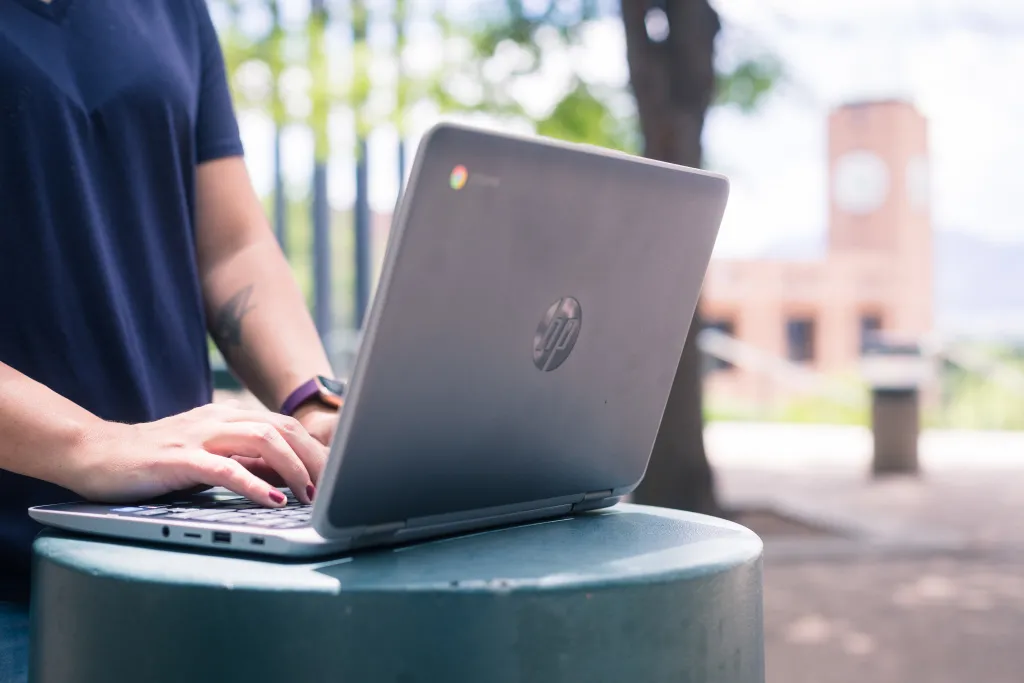
Chromebook FAQs
A Chromebook is another type of laptop. The major difference between a Chromebook and other laptops is that it uses the Google Chrome operating system (OS). Your machine is designed to run the Google Chrome OS instead of Microsoft Windows or Mac OS. Another difference that distinguishes your Chromebook from other laptops is that its applications and documents are stored in the cloud rather than an internal hard drive.
Accessing your applications and documents can be easier and quicker. You can also access your apps and documents from multiple devices across various platforms. With virus protection built-in, multiple layers of security, and automatic updates, your Chromebook keeps your documents and applications safe from viruses, malware, and other possible security issues.
You can locate the user manual for your Chromebook on the HP website.
The answer depends on what you plan to do on your Chromebook. While we know many students will find that the Chromebook will cover most of their computing needs, others will need to purchase a computer with additional features. The Chromebook can do many of the same functions of a traditional computer, but there are specific software programs and tasks that will not work on a Chromebook.
Protecting your university-provided Chromebook from damage and theft is important. Here are some guidelines:
- Carry your Chromebook in a backpack/tote that is made for a laptop computer. A purse or regular backpack does not have adequate padding and the Chromebook can be damaged if dropped.
- Keep sticky or runny foods away from your Chromebook. Such foods may permanently damage your Chromebook keyboard or other delicate components and most warranties do not cover such damage.
- Keep open drink containers away from your Chromebook. Soda and other beverages can cause keyboard keys to stick or become inoperable. Other damage to delicate components may also result from such spillage and most warranties do not cover such damage.
- Use a surge protector if you are going to keep your Chromebook hooked up to an electrical outlet, particularly if your computer is turned on. An electrical surge may not hurt it one time, but continued surges could potentially damage it and lose all of your critical data.
- If at all possible do not leave your Chromebook in a cold environment. Condensation, when you return it to a warm environment, could cause the circuitry to short out. If it has been exposed to a cold environment, always let it warm up before turning it on.
- Do not leave your Chromebook unattended in a classroom or other area.
- Do not leave the Chromebook in your car where it is visible.
- Do not check it as baggage when flying, but take it on as a carry-on.
- Do not try to repair your Chromebook or open it up to see inside or add components. You may inadvertently cause more damage by your lack of knowledge.
- Do not color (markers, crayons, etc.) the keys on your Chromebook keyboard.
- Do not stick stickers on the exterior of your Chromebook that cannot be easily removed by you without damage to the UCCS Service Desk.
- Do not have your Chromebook repaired other than with UCCS OIT. All repairs to campus-issued Chromebook must be done at the Chromebook.
- If you drop your Chromebook into water or spill liquid on the keyboard by accident take the notebook computer immediately to the UCCS Service Desk. If a spill is taken care of immediately, the laptop computer and keyboard can be cleaned and dried (preventing sticky and non-working keys and non-functioning components) without a problem.
The device is yours to customize and use for classes, Canvas, Office 365, or even Netflix. You are encouraged to use the technology for both schoolwork and your personal life.
UCCS monitors the network for security flaws, updates, etc. but ensures that privacy is intact at all times. Please refer to UCCS' privacy policy and responsible computing policy for further explanation:
https://www.uccs.edu/vcaf/sites/vcaf/files/inline-files/700-002.pdf
We will not be monitoring your day-to-day activities on your Chromebook. The mobile device management system does collect data on the apps that are installed on your Chromebook, but does not provide data on when, where, or how those apps were used. That being said, UCCS does monitor all network traffic and the mobile device management system will have the ability to alert us if you do something illegal, try to jailbreak your device, or download an app not found in the official App Store. If we are alerted to these activities, we will notify you. The full answer can be found in the Student Technology Responsibility and Liability Agreement. Each app you use has a privacy statement that explains how the app collects and uses information.
Google also has a variety of accessibility resources. When students claim their device on the Chromebook landing page, they will have the option to connect with the Disability Services Coordinator if they have accessibility needs that need to be addressed in their technology use.